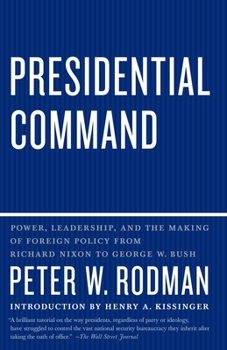Presidential Command: Power, Leadership, and the Making of Foreign Policy from Richard Nixon to George W. Bush
Select Format
Select Condition 
Book Overview
An official in the Nixon, Ford, Reagan, and both Bush administrations, Peter W. Rodman draws on his firsthand knowledge of the Oval Office to explore the foreign-policy leadership of every president... This description may be from another edition of this product.
Format:Paperback
Language:English
ISBN:0307390527
ISBN13:9780307390523
Release Date:January 2010
Publisher:Knopf Doubleday Publishing Group
Length:368 Pages
Weight:1.85 lbs.
Dimensions:0.8" x 5.1" x 8.1"
Customer Reviews
3 ratings
PRESIDENTIAL COMMAND
Published by Thriftbooks.com User , 14 years ago
I highly recommend this book for people who are interested in foreign policy. Rodman presents our former presidents in action with a lot of details which are unkown to most of us. The book make me think who is the most influential person in foreign policy in President Obama's Administration. The Secretary of State? The Secretary of Defense? The head of the Pentagon? The National Security Advisor? I hope we do not have a headless chicken operation in foreign policy. As we learned from Peter Rodman's book, each president has a particular management style in foreign policy. Traditionaly,the key person who advice the president has a well rounded intelectual education in geopolitics; good management skills; without a personal agenda to advance his or her own interest, and above all, that person has the full trust of the president.
A Perfect Mix of Experience and Intellect
Published by Thriftbooks.com User , 15 years ago
This book is a must read for anybody interested in United States foreign policy. It is gracefully written, and exudes a forthright integrity that can only come from deep, hands-on experience. Peter Rodman served in senior posts in every Republican administration since Nixon, working at State, DoD, and the White House. He participated directly in many of the events that he analyzes. Despite this close personal association with the subject matter, throughout the book Rodman maintains a cold and penetrating objectivity. Rodman does reveal his personal loyalties and policy preferences, but this book is utterly devoid of special pleading. Contrary to what some of the other reviewers have suggested, it does not attempt to sell this or that policy position or to glorify this or that personality. Its subject is the set of challenges that ALL presidents, Republican and Democratic, face when they try to set up an effective process for making national security policy. I served in government with Rodman in the last administration. Having come from academia with no previous policy experience, his book has helped me enormously to make some sense out of what I learned on the inside. On the outside, policy analysis and debate is a purely intellectual activity. On the inside, the intellectual component is overshadowed by the interplay between personalities and bureaucracies that this book so deftly describes. Peter Rodman passed away last August. He was a very gentle and intelligent man. While I am thankful that he managed to leave us this book (as well as his other work, MORE PRECIOUS THAN PEACE), its unique quality makes one sadly aware of how much more he had to offer as a scholar.
National Security v. State Department
Published by Thriftbooks.com User , 15 years ago
In a very well-researched and scholarly book, Rodman walks through styles of presidential leadership and decision-making, from the Nixon years to the end of the George W. Bush's administration. /Presidential Command/ is an analysis of how decisions were made and the ongoing conflict in vision and execution between the State Department and the National Security Advisors. By looking at how each president picked his closest advisors, and how those advisors advised, obstructed, or used the national security bureaucracy to make their own policy Rodman not only sheds light on the past, but on the inherent problems with an entrenched bureaucracy that doesn't change every four to eight years. His analysis of the players involved, from Henry Kissinger (who also wrote the introduction and for whom Rodman worked) to Dick Cheney, and the rest of the most recent administration, is insightful and interesting to read. Rodman was a long-time Washington insider, working for every Republican president since Nixon (during the Clinton years, he was a senior editor at the /National Review/) and his grasp of the inherent conflict between State and National Security will probably make this book required reading in many parts of the Obama administration.






